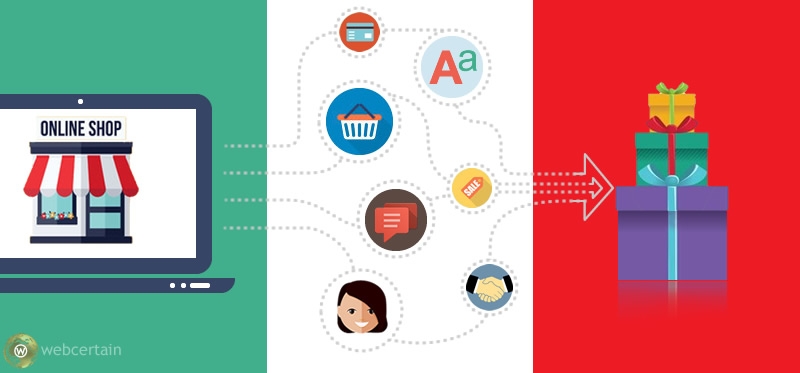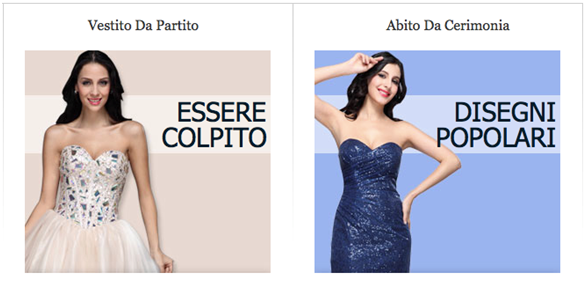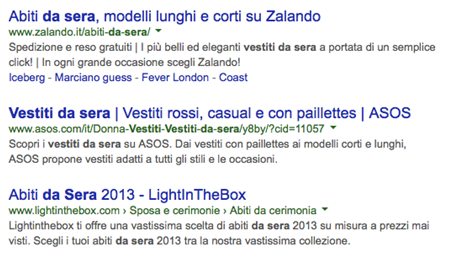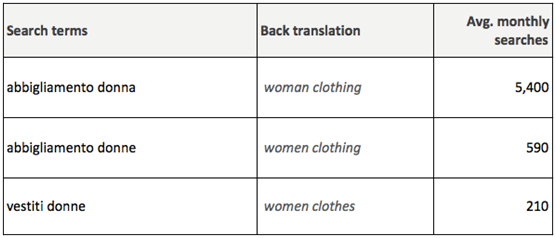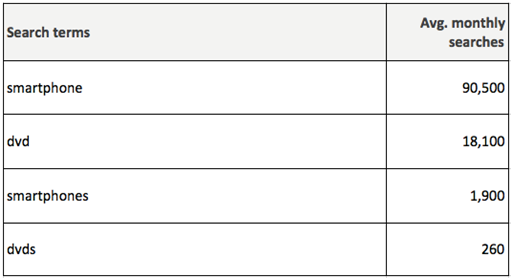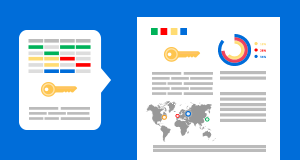Whilst more and more people around the world are becoming increasingly comfortable with buying products online because of its ease of use and the ability to search for discounts, Italy bucks the trend when comparing digital and physical sales: 88% of the Italians search online but still prefer to buy in a shop.
This shows that the confidence and trust in purchasing online is lower than in other countries. There is a need for retailers in Italy to deliver an equally clear and informative experience “face-to-face” in which to build confidence, reassurance and trust. Italians require this level of customer service to ensure the product they are purchasing meets personal requirements whilst answering any questions they may have.
In this blog post (part one of two), I will delve into the linguistic aspects of Italian search behaviour with regards to ecommerce. In my second blog post, I will focus more on the cultural factors that you should take into account when targeting the Italian ecommerce sphere.
When you are planning your SEO strategy and PPC ad campaigns for Italian users visiting your website, it is vital to ensure that they find an environment they can relate to and which “speaks the same language” as them.
This goal cannot be achieved if you rely on machine translations and do not involve native speakers in the creation of your content.
Think about finding a website that sells something you really like, but their product pages, including the descriptions, are poorly worded with grammatical errors – this would leave you suspicious and more likely to leave the site for an alternative provider.
Service Not Found
Choosing the “right” words
There are aspects in every language that refer to culture; the choice of one word instead of another brings with it a number of reasons that are beyond the simple literal translation.
For example, think about the word “right” and what happens when you put it into a context: the product right for you, the product displayed on your right, you have the right to change your product. In Italian there are three different words for “right” (giusto, destra, diritto) so if you enter the English sentence into Google Translate, it will be like playing Russian roulette: the meaning could be changed when translated and what your Italian audience will get might not be what you intended.
Style and grammar
When we talk about language and culture, we also talk about style and grammar: capitalisation, punctuation, accents, use of prepositions, singular and plural, feminine, masculine and so on.
Capitalisation
Capitalising words in Italian titles has to be done carefully. A general rule, common to many other languages, is to avoid capitalising prepositions and to use capitalisation to highlight specific words that you want to draw the reader’s attention to.
In order to focus on the important words, you might decide to avoid prepositions and just write everything in capital letters; but a title with no prepositions is not appealing to the Italian audience. Users will click on titles that appear natural and follow the structure of the Italian language. A title that respects this is a good title.
Let’s have a look at a bad example:
The literal translation of this title is: Dresses Evening Cheap – To Buy Dresses Evening Ceremony
Clearly a machine translator has been used here and the evidence is also found in the description where the word “party – festa” has been translated as “political party – partito” instead of the intended meaning of celebration/formal wear.
If you are an online clothing retailer investing in a PPC campaign for English-speaking countries, you will want to consider entering the word political into your list of negatives as much as you will want to avoid using machine translators when targeting a foreign country. If the above example was a PPC campaign, you would have risked having people looking for unrelated searches landing on your page, incurring the risk of paying for unwanted clicks.
From a SEO point of view, a search engine is unlikely to display this URL for political party searches but you will lose the chance of reaching a better ranking position and you will lose clicks as your potential customers will not search for “political party dresses – vestito da partito” but “formal/party dresses – vestito da sera/festa”. You will also lose the trust of your potential clients, who will be turned off by the risk of a potential fraud.
For the sake of research and just common curiosity, I could not help but to click on the website. On the home page we have what in English would say: “Political Party Dress” BEING SHOT and “Ceremony Dress” FOLK DRAWINGS. This again reiterates the need to use native speakers when creating website content.
Going back to the original point, capitalisation should be used in order to give harmony to the title and to help the users to focus on specific words, ideally the main keywords they searched for.
Good examples of capitalisation, appealing in terms of style and with no linguistic issues, are:
Bear in mind also that some words in Italian change meaning when you capitalise the starting letter, e.g. Paese/country, paese/town. “Italy is the country I grew up in, Vasto is my hometown.” (L’Italia è il Paese dove sono cresciuta, Vasto è il mio paese d’origine).
Another example is Papa/Pope, papà/dad. Here both the accent and capitalisation play a significant role in defining the meaning of a word. Let’s have a look at the impact of accents.
Words with or without accents
Italian is different to other languages, where accents can change the meaning of a word. In Italian, accents are more rhythm/stress related and they are usually used on words ending with a vowel: à, è, é, ì, ò, ó, ù.
People generally find them on their Italian keyboards but if they are typing from a different keyboard, they may type the word without an accent or use an apostrophe instead. If you type a word that is meant to have an accent without the accent or with an apostrophe, Google will display only results with the accent and usually in the same ranking position in the results.
The number of results is generally higher with the accent and lower without, but keyword research will show search volume for both; resulting in some websites choosing to include both versions in their content. However, it is strongly recommended to use accented characters in each visible part of your text, as they are the correct form and will make a better impression on your visitors.
SEO Booster for Italy

In order to have a high ranking on Google in Italy and attract relevant traffic, your website needs to be optimised. A search-trained Italian native will begin the SEO process by conducting keyword research to identify the relevant terms for the Italian market. They will use these keywords to do keyword mapping and produce Italian meta-data for your website. As well as on-page optimisation, they will also submit your website to relevant directories in Italy to boost your backlink profile.
Sponsored
Singular and plural
Italian internet users generally search using singular words unless they are looking for a range of products/services, lists, galleries or comparisons. Choosing which version to target will depend on your landing pages and needs to be focused on what each page of your website offers and sometimes it may be possible and beneficial to use both.
It is important to pay attention to the differences between languages. Take Clothing as an example: in English we use the plural Women’s Clothing/Men’s Clothing whereas in Italian it is Abbigliamento Donna/Abbigliamento Uomo (Woman Clothing/Man Clothing).
Below we can see the results of keyword research targeting Italy. The result shows a reverse in ranking order compared to searches in English-speaking countries.
A general rule applies to foreign words. When using an English word in an Italian sentence, for example, it will stop following English grammar rules. So for instance a range of smartphones, a collection of DVDs will be una scelta di smartphone, una collezione di dvd.
Further keyword research targeting Italy, shown below, shows a consistent difference between singular and plural, despite those words indicating products which are more likely to be searched using the plural. A website targeting Italy, offering a choice of DVDs for example, will benefit from using the singular in the title.
Feminine and masculine
In Italian, every noun has a gender, so a table, for example, is a masculine word (tavolo) and a chair is a feminine word (sedia). Therefore articles, which we rarely omit, have to be used according to the genders (il tavolo, la sedia) and change according to the singular and plural forms (i tavoli, le sedie).
The rules are not very straightforward – our masculine word table will become a feminine word when we refer to a big dining table or tableful (la tavolata).
Other exceptions include feminine nouns ending with a masculine vowel, o, which will require a feminine article, like the hand (la mano) and masculine nouns ending with a feminine vowel, a, that will require a masculine article like the poet (il poeta).
This research aimed to show that both content and choice of the right keywords is key to generating trust, confidence and increasing relationships with consumers by delivering an all-round experience they desire; thus in return gaining customer retention and positive reviews that attract more customers. Using machine/literal translations in most of the cases it will just generate confusion. With Google rewarding top ranking results to those that deliver a consistent and accurate customer-centric experience, on-page SEO is extremely important.
Your website pages should be easy to navigate and well-presented, showing useful information, taking care of descriptions and translating as many page as possible.
In my next blog post, we will take a closer look at the cultural aspects that diversify Italian internet users, the future of ecommerce in Italy, trends and how websites can benefit and improve their customer experience/conversion.
Serena Mancini
Latest posts by Serena Mancini (see all)
- Three Ways To Combine PPC And SEO For A Successful Marketing Strategy - October 16, 2017
- Keyword Research Is Heading Towards Semantic SEO - April 4, 2017
- What To Consider When Setting Up An E-Commerce Presence In Italy – Part 2 - November 10, 2014
